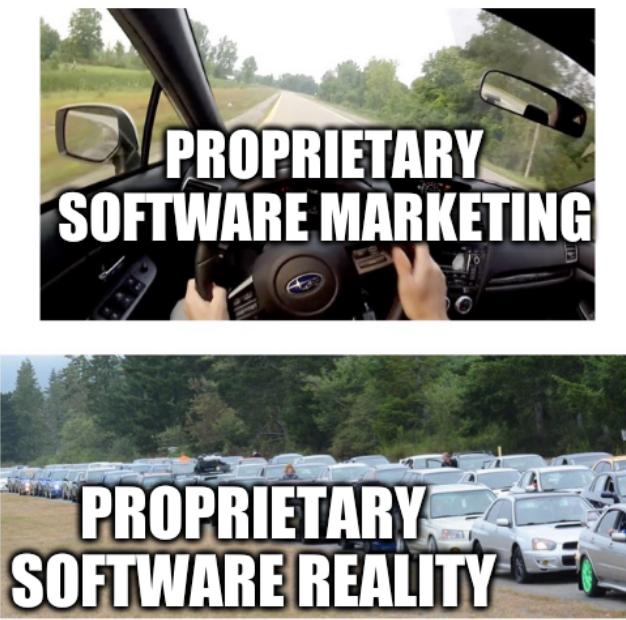

"More than 10 years ago E-mail surfaced in the courts showing how Microsoft had worked behind the scenes to bury the disaster of Vista, p[l]aying a bunch of so-called 'journalists' (more like Microsoft moles with media access/credentials) to manufacture a bunch of fake hype."We need not replace one evil with another or one brand€® with another (one could argue that Apple's marketing strategy isn't more ethical than Microsoft's).
Today we've carried on reading the archives of Debian-Private -- the first lump of which we published last Saturday, i.e. the end of August. In that installment alone there are over 8,000 E-mails, some technical in nature and some akin to gossip (we don't care much about the gossip, even if it's more 'juicy' in nature). Much is being said there about Richard Stallman, the FSF, Red Hat and so on. It is an important glimpse at the history of GNU/Linux through the lenses of the most important distribution (the base system for most distributions, with perhaps hundreds of millions installations 'out there', maybe over a billion if embedded devices are counted).
"Today we've carried on reading the archives of Debian-Private -- the first lump of which we published last Saturday, i.e. the end of August."Techrights wrote several articles before releasing that trove of old E-mails, expressing the purpose and intent, which wasn't to harm but to research and shed light. Right now, Free software is under attack and the patterns aren't unprecedented (the Halloween Documents were already seen in 1998); we need to understand them in order to respond effectively. We need not hide things and brush under the rug a bunch of old communications which prove we're all humans (and yes, everybody can have a temper tantrum sometimes).
It is expected that some time soon we'll publish another batch of E-mails (timeline unclear, dependent on leaks/leakers). Every now and then we find something relevant to the present; if not a 'smoking gun', then at least a cautionary tale. The modus operandi, so to speak, changes very little over time. The woes are alike.
Having just reviewed about 500 comments regarding our 'Linusgate' article, we've noticed an old distraction tactic, basically anonymous cowards saying things along the lines of, "this is old news" (even if the underlying E-mails were never published before and the general public could not see them until 8 days ago).
"In Techrights we publish full logs each morning, including most E-mails related to the site (albeit anonymised, for obvious reasons)."If we live in a free world with Free software and free speech, we ought not be afraid of transparency. Most of what I've seen so far is hardly controversial (I went through about 2,000 E-mails individually); there are no conspiracies against people but an open debate, mostly technical in nature, with a little gossip or disputes here and there. There's no reason to keep Debian-Private secret for nearly 25 years (some of these E-mails will be older than 25 years in a matter of months). Maybe at some point the Debian project itself will decide to publish these, gradually, instead of others doing it (imposed transparency). We sure hope so. It's well overdue.
When people install GNU/Linux (or some BSD distribution) they deserve to know what they're getting, including the nature of the developers/community/ies that pack together all those bits of software. We need not hide from who/what we are. In Techrights we publish full logs each morning, including most E-mails related to the site (albeit anonymised, for obvious reasons). We've been doing this since 2008 and it never really harmed us. Honestly, it hasn't!
We've admittedly neglected some European Patent Office (EPO) scandals lately. There's stuff we could cover, such as this new rant from lawyers. "The EPO should tell parties directly if the location of an oral hearing has been changed, in-house counsel say, but others believe this is unnecessary," says a report. The EPO remains very secretive, but then again it's a patent office, not a Free software community. It's trying to work in secret at its own peril as sooner or later people typically leak to us all/most of the documents of interest, whereupon the EPO fails to 'control the narrative' and is left red-faced.
Being transparent is generally a lot better; it helps avert scandals and outrage because people behave differently when they're seen (or there's perception of accountability). Now going back to Debian, one recurring theme or complaint is that gossip networks were created and even encouraged, emboldening a bunch of non-productive people to experiment on volunteers with unwarranted witch-hunts. Had there been more transparency, this would not be possible. Thus, our transparency drive carries on... ⬆